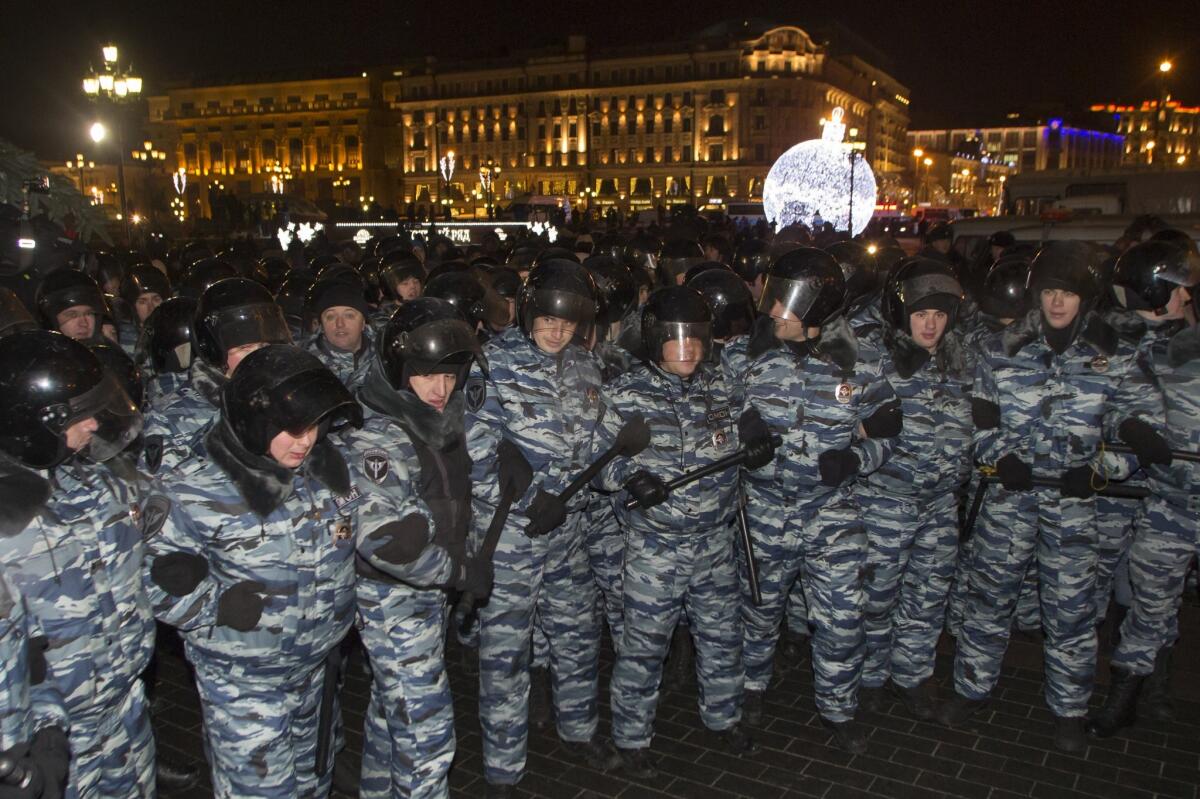In bold display, thousands in Russia protest Alexei Navalny sentence

Reporting from Moscow — Thousands of opposition supporters defied freezing temperatures and a ban on protests Tuesday night to condemn the fraud conviction of Kremlin critic Alexei Navalny in the boldest display in years of discontent with the leadership of President Vladimir Putin.
The outpouring of support for Navalny was probably fueled by growing anger over Russia’s economic crisis brought about by falling global oil prices and Western sanctions for Putin’s annexation of Ukraine’s Crimea region.
The ruble has lost nearly half its value as spooked foreign investors pull their dollars and euros out of the Russian markets, and the energy sales revenue on which the government budget is heavily dependent has tumbled to about half the forecast per-barrel price.
Navalny, a lawyer and popular blogger, rose to prominence during massive street protests that swept Moscow in 2011 and early 2012 after a parliamentary election that critics charged was flawed. Even before the protests, Navalny had become a thorn in the Kremlin’s side, using his blog to allege high-level corruption.
Protesters chanting “Navalny, Navalny” were allowed to gather for about an hour after the 7 p.m. start of the rally on central Moscow’s Manezh Square, site of an upscale mall and ringed by some of the capital’s most opulent hotels. Police then dispersed the demonstrators; unauthorized gatherings have been banned since the protests three years ago.
Navalny was already under house arrest and awaiting sentencing after violating the terms of a five-year suspended term handed down last year for his alleged theft of about $276,000 from a timber firm in 2009. He was scheduled to appear in a Moscow court on Jan. 15, but the sentencing was suddenly moved up to Tuesday, a day before the New Year’s Eve holiday, Russia’s biggest annual celebration. Authorities apparently were counting on the traditional revelry to distract many of the 30,000 opposition supporters who had pledged via social media to rally on Navalny’s behalf if he was sentenced next month.
Widely seen as the only member of Russia’s depleted and demoralized opposition capable of mounting a significant challenge to Putin, Navalny is mainly popular among the middle class in Moscow, where he took 27% of the vote in last year’s mayoral election. That vote was won by Kremlin-backed incumbent Sergei Sobyanin.
The Manezh Square demonstration followed the moved-up court hearing, during which Judge Yelena Korobchenko convicted Navalny and his brother, Oleg, of stealing about $529,000 from two firms, including an affiliate of French cosmetics company Yves Rocher. She handed Navalny a 3 1/2-year suspended sentence, and his brother received a 3 1/2-year prison sentence and was led from the courtroom in handcuffs. Both brothers deny the charges, contending that they were political retribution.
Moscow police, who had warned they would crack down on any unauthorized gathering, said they had arrested about 100 demonstrators for “disturbing the public order” at the Manezh designer boutiques where shoppers were busy making their last-minute holiday purchases. Independent news websites estimated the number of arrests was twice as high.
Pussy Riot, the Russian female punk band, released a new video that spread word of the demonstration with its best-known members, Nadya Tolokonnikova and Maria Alekhina. The rockers, who were jailed for nearly two years for insulting Putin in a punk performance at a Moscow cathedral, dressed up as vampish witches who fly off on broomsticks at the end of the short clip in the manner of Mikhail Bulgakov’s novel “The Master and Margarita,” an allegorical tale of Stalinist repression.
Those who braved bitter cold and hundreds of police and security forces at Manezh Square spoke of more dissent to come.
Andrei, a real estate agent who declined to give his last name, said protests would only grow as the Russian economy, which contracted last month for the first time since 2011, slides further into recession next year. “As soon as people see that their fridges are empty, they will look to the top for someone to blame, and then there will be really large demonstrations,” he said.
Alexei Navalny was detained by police as he attempted to join the demonstration.
“I didn’t manage to make it to Manezh,” Navalny said via Twitter as he was being led away to a police van. “But that doesn’t mean we can’t pull this off. I call on everyone to come. They can’t arrest everyone.”
He was later escorted home by authorities, opposition supporters reported.
After the verdict and the jailing of his brother, Navalny lashed out at the judge, accusing her of going after family members to stifle political foes of the Kremlin.
“This time the authorities are not simply trying to humiliate and imprison their political opponents,” he told reporters after the hearing. “They are trying to humiliate and torment the relatives of the people who are their political opponents.”
Russia’s prosecutor had recommended harsher penalties, a 10-year prison term for Navalny and an eight-year sentence for his brother.
Political analysts said the last-minute decision to hand down more lenient terms could reflect disagreement between the Russian elite eager to punish Alexei Navalny and others who want to avoid creating a political martyr.
Within a few hours of the court hearing, a leading Russian lawmaker demanded a review of Alexei Navalny’s sentence, saying it was too light.
“Any bureaucrat, whatever his rank, would have received an eight-year sentence for such a crime,” Mikhail Markelov, the first deputy head of the committee for social and religious affairs in the lower house of parliament, told Interfax.
Human rights groups assailed the court’s decision to hand Oleg Navalny a prison term, saying the move revived the Soviet tradition of punishing the relatives of dissidents.
Tuesday’s verdict was the latest in a series of legal proceedings against Alexei Navalny, which he says have been fabricated by the authorities to discredit and sideline a political opponent. Under Russian law, convicted felons are barred from standing for public office.
Although visibly upset when the judge read out the verdict against his brother in court, Alexei Navalny pledged to continue the opposition’s battle.
“The authorities don’t deserve to exist. I call everybody to take to the streets,” he said outside the courthouse.
“Alexei Navalny is guilty of nothing more than daring to challenge Vladimir Putin’s corrupt, repressive government,” said Robert Herman, a vice president with pro-democracy watchdog Freedom House. “Any objective observer would say that the state’s case against him and Oleg would fail to pass muster in a fair and transparent judicial system.”
Twitter: @cjwilliamslat
Special correspondent Gorst reported from Moscow and Times staff writer Williams from Los Angeles.
More to Read
Sign up for Essential California
The most important California stories and recommendations in your inbox every morning.
You may occasionally receive promotional content from the Los Angeles Times.











